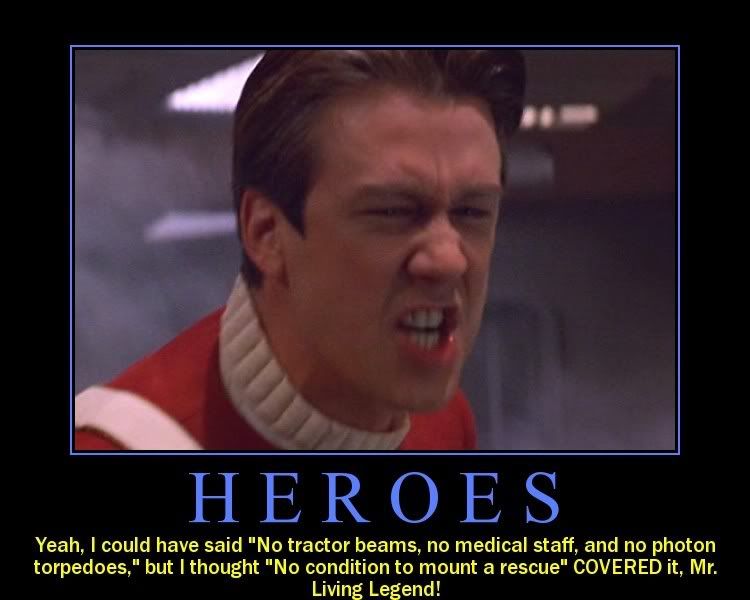I was re-watching Generations recently, and I had always thought Harriman was being wimpy at the beginning by not wanting to charge in on a rescue mission to save those two ships trapped in the energy ribbon, but now that I look on it, I wonder if he might have been right about being cautious about not taking the Ent-B near the ribbon, considering the ship's condition.
As he told Kirk, the starship was totally unprepared to launch a rescue - it didn't have the equipment it needed, because it was on a press showing, not a mission. You wouldn't send firefighters into a raging fire without proper safety equipment. Harriman saying that they were not capable of launching a rescue at that point was actually true, in a lot of ways...
When Harriman did listen to Kirk's advice to take the Enterprise in closer, the ship became trapped, and would have been destroyed with all its crew (and the civilian guests) if someone hadn't been able to think up a way to get it free (thank goodness for Scotty!)
Yes, it had been established on the show that it is the duty of a Starfleet vessel to protect Federation citizens and those in need, but what if such a rescue attempt pretty much guarantees the destruction of everyone? Even Picard was forced to retreat from some rescue operations when the risk to his ship became to great... a captain also has to protect the lives of his crew.
In a fire, fire fighters are sent into burning buildings, risking their lives to save lives ... but would you, as their chief, send them into that burning house if they had just come from a parade, where they were driving a float with little or no proper equipment to fight a fire with? - That is the dilemma that Harriman faced - not an easy decision...
Also, I remember being shocked when I first saw the movie that none of his command crew offered up any suggestions to help him save the ships once they committed to the rescue. Whenever Kirk faced a dangerous situation, he always had Spock, Scott, etc to offer suggestions, as did Picard with his crew, and the other Trek captains. All Harriman's officers did were report what was happening. Where was his science officer? Where was his engineer? The crew did not look like young cadets, so why were they not offering up any ideas? Harriman was desperately trying to come up with one solution after another, and finally had to turn to Kirk and co. for help when his ideas didn't work. Where was his crew support?
So, I think Harriman was faced with a really touch choice ... was attempting a rescue too risky? Should he have trusted his initial instincts?
Opinions?
As he told Kirk, the starship was totally unprepared to launch a rescue - it didn't have the equipment it needed, because it was on a press showing, not a mission. You wouldn't send firefighters into a raging fire without proper safety equipment. Harriman saying that they were not capable of launching a rescue at that point was actually true, in a lot of ways...
When Harriman did listen to Kirk's advice to take the Enterprise in closer, the ship became trapped, and would have been destroyed with all its crew (and the civilian guests) if someone hadn't been able to think up a way to get it free (thank goodness for Scotty!)
Yes, it had been established on the show that it is the duty of a Starfleet vessel to protect Federation citizens and those in need, but what if such a rescue attempt pretty much guarantees the destruction of everyone? Even Picard was forced to retreat from some rescue operations when the risk to his ship became to great... a captain also has to protect the lives of his crew.
In a fire, fire fighters are sent into burning buildings, risking their lives to save lives ... but would you, as their chief, send them into that burning house if they had just come from a parade, where they were driving a float with little or no proper equipment to fight a fire with? - That is the dilemma that Harriman faced - not an easy decision...
Also, I remember being shocked when I first saw the movie that none of his command crew offered up any suggestions to help him save the ships once they committed to the rescue. Whenever Kirk faced a dangerous situation, he always had Spock, Scott, etc to offer suggestions, as did Picard with his crew, and the other Trek captains. All Harriman's officers did were report what was happening. Where was his science officer? Where was his engineer? The crew did not look like young cadets, so why were they not offering up any ideas? Harriman was desperately trying to come up with one solution after another, and finally had to turn to Kirk and co. for help when his ideas didn't work. Where was his crew support?
So, I think Harriman was faced with a really touch choice ... was attempting a rescue too risky? Should he have trusted his initial instincts?
Opinions?


